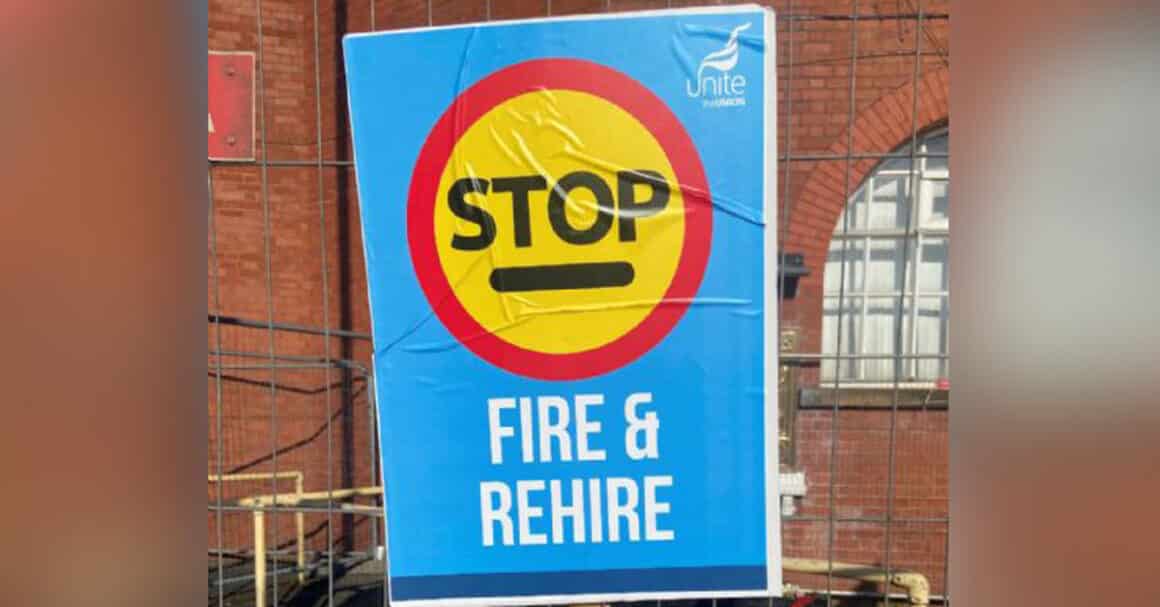

By Tim Nailsea
KEIR STARMER’S announcement of a watered down ‘workers rights’ plan has revealed a division between the Labour leadership and some trade union leaders.
Bowing to pressure from business the Labour Party has rebranded its ‘new deal for working people’ as ‘Labour’s plan to make work pay’. The New Deal for Working People, launched in 2021, pledged to ban fire and rehire, end zero hour contracts and remove the two-year qualifying period for employment rights.
Backsliding
Labour are now suggesting that they will enter a ‘consultation process’ with business before implementing key policies, with growing fears it will row back in areas such as zero-hours contracts, parental and sick leave, and fire and rehire.
Under the new proposals, zero-hours contracts will no longer be banned outright, replaced with a right to a contract reflecting an employee’s work pattern. Rachel Reeves has recently spoken in defence of fire and rehire ‘in limited circumstances’, such as to ward off bankruptcy or mass redundancies.
Starmer’s Labour therefore continues in its strategy of proving that it is a safe pair of hands for British capitalism, and distancing itself ever further from the socialist agenda of the Corbyn years.
However, it is important to note that the workers’ rights pledges, even before the recent U-turns, were still extremely limited. While welcome, policies such as banning zero-hours contracts and fire and rehire were really just aims to regulate some of the more heinous abuses by British employers.
Unions refuse to fight
During the National Policy Forum, where these policies were discussed in July last year, the only union to vote against the new proposals was Unite. General Secretary Sharon Graham has since publicly criticised Reeves’ U-turn, saying the plans had ‘more holes than Swiss cheese’.
Likewise TUC president and leader of the Fire Brigade’s Union Matt Wrack, on hearing Starmer say he would not pay the junior doctors their pay claim, said, ‘something will need to be done about it. Otherwise, you may see people taking further industrial action.’
However, many union leaders voiced their support for the plans, including Unison General Secretary Christina McAnea, who said they ‘will make work fairer and boost the economy too’.
Bureaucracy
This reflects the two different approaches within the trade union bureaucracy towards the Labour Party. Right wingers like McAnea aim to cozy up to the Labour leader in the hopes of having a seat at the table in Number 10. More left wing leaders like Graham aim to exert pressure by deploying more militant rhetoric to pull Labour leftwards.
Despite being openly critical, Graham’s support for Labour remains largely unconditional, with Graham ending an article criticising the policies by saying, ‘So yes, vote Labour. But do it with your eyes wide open and don’t be afraid to push for more from a party built to be the workers’ voice.’
Wrack also ended his interview with The Guardian claiming the plan was ‘central to Labour’s campaign. I think that’s a positive message to take to working people and trade unions.’
This reflects the fundamental flaw in the trade union bureaucracy, of both left and right varieties, towards the Labour Party. While they may occasionally voice criticisms of the Labour leadership, they ultimately see their interests as best served by having a Labour government in power. Their concept of trade unionism is ultimately one of compromise.
The role of trade union leaders in a capitalist system is to arbitrate between workers and bosses in order to win the best deal for their members. A Labour Party in power provides a line for the union leaders into the state, and, as they see at, an opportunity to make more gains through negotiation and horse-trading.
But for rank and file union members, a Labour government provides a different line, one which can pull Starmer, Reeves and co. into conceding to their demands. But to use this line successfully we have to force the union tops to confront Labour in office—even if that means bringing the government down—or make way for those that will.
Our task is to organise the rank and file to hold both the Labour and trade union leaders to their word and to go further.